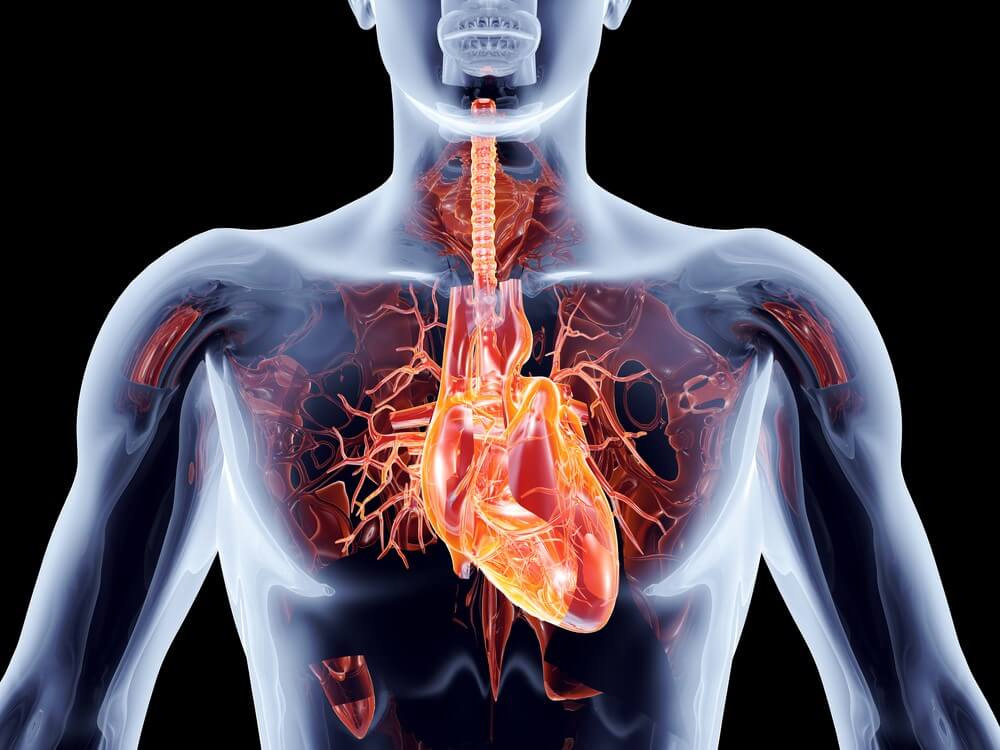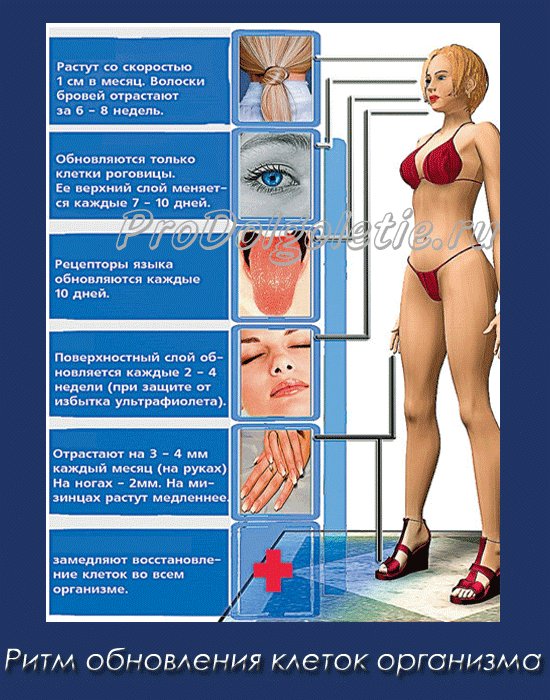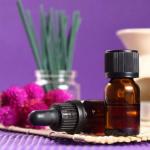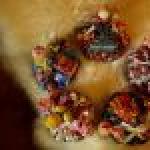We lose hair every day, but we usually don't go bald; we cut our nails, but they still grow back. We remove dead skin cells to give it smoothness and radiance, we carry out procedures that start the process of skin regeneration. All this is possible thanks to the body's ability to renew itself. You must have heard that the human body is completely renewed every 7 years, that is, at the end of this period you become a different person, because every cell of your body is replaced by a new one. Sounds amazing! But is this really so and why do we, despite the renewal of the body, continue to age?
Indeed, the lifetime of individual cells of the human body is limited. After the expiration of this period, the cells die, and new ones take their place. The adult human body is made up of a huge number of cells - approximately 50-75 trillion - and each type of cell has its own "lifespan". After the death of a person, not all cells die immediately - some of them take several minutes for this, others - hours, and others - a day. The rate of cell death is one of the factors used to determine the cause and time of a person's death.
The rate of cell death is one of the factors used to determine the cause and time of a person's death.
Below site will consider:
- the approximate time of renewal of various cells, tissues and organs of the body;
- why do we get old.
How fast is the renewal of various cells in the body?
Below are the approximate rates of cell renewal in the human body:
- Red blood cells (erythrocytes), which carry oxygen, live for about four months.
- The average lifespan of white blood cells is slightly more than a year. At the same time, the most numerous group of leukocytes - neutrophils - live only a couple of hours, eosinophils - 2-5 days.
- Platelets live for about 10 days.
- Lymphocytes are updated at a rate of 10,000 cells per second.
- Epidermal cells are updated approximately every 10-30 days of the week, the skin recovers 4 times faster after minor injuries.
- The "age" of hair on the head can reach 6 - 7 years. Every day, the hair on the head grows by about 0.5 mm. Hair on other parts of the body - about 0.27 mm per day. Eyebrows are renewed every 64 days.
- The surface of the cornea of the eye is covered with a thin layer of cells that are constantly updated in 7–10 days. Retinal cells do not renew themselves, as does the lens of the eye, so age-related visual impairment is a common problem. However, experts are developing methods of retinal regeneration using stem cells.
- The epithelial cells of the small intestine are renewed every 2-4 days, the colon - about every 4 days, the gastric mucosa - about 5 days.
- Cells in the cerebral cortex, as far as we know today, are not capable of regeneration, unlike hippocampal neurons. Damaged nerve cells can recover to a certain extent if the body of the neuron is not damaged.
- The rate of nerve regeneration after injury is approximately 2–3 mm per day.
- The average age of a fat cell is 8 years. Every year, 10% of fat cells are replaced by new ones.
- Renewal of liver cells takes approximately 300-500 days. The human liver has an excellent ability to regenerate. If you remove 70% of this organ, it will recover to normal size in just a couple of months. Surgeons removed even 90% of the liver, but the recovery in this case was incomplete.
- The cells of the kidneys and spleen take 300-500 days to renew themselves.
- Nails grow about 3.5mm monthly, although the pinky nail grows the slowest. Toenails grow at a rate of about 1.6 mm per month, with the thumbnail growing the fastest.
- The heart is one of the slowest regenerating organs in the human body. In a 25-year-old person, only 1 percent of heart cells are renewed annually, this figure decreases with age. Less than half of the heart cells are renewed in a lifetime.
The heart is one of the slowest regenerating organs in the human body.
- The taste buds on the tongue are renewed every 10 days.
- Fingertips can partially regenerate after injuries. The best results are observed in children a few months after the injury. An unaffected nail bed is needed to restore the fingertips. The new fingertip is sensitive and has an imprint on it.
- The mucous membrane of the bronchioles is renewed every 2–10 days.
- Microscopic air sacs - alveoli - are updated in 11-12 months, and superficial lung cells - in 2-3 weeks.
- Muscle cells are "long-livers" because their lifespan is 15 years.
- The cells of the skeleton are constantly renewed, but rather slowly - 10% per year, and it takes about 10 years to completely replace the cells of the skeleton.

Why, despite the renewal of the body, we grow old and die?
The fact of renewal of the body was established in the early 50s in the course of observing the movements of objects with radioactive atoms embedded in them. Jonas Friesen, a molecular biologist from Sweden, has been studying body renewal by measuring levels of radioactive carbon-14. He found that every 7-10 years most of the body's cells are replaced by new ones. Of course, this figure is conditional, taking into account the rate of renewal, for example, of heart and skeletal cells or the lack of the ability to regenerate certain neurons, retinal cells, lens, and oocytes.
Why yesterday at the dentist it was almost painless, but today without anesthesia in any way? Why, waking up at dawn, you feel lost, and in the morning, even if you obviously didn’t get enough sleep, the mood is quite normal? The answer is simple. And the science of chronobiology knows it: because our life is predetermined by biological rhythms, and our body has its own clock and it doesn’t like it very much when you do something not according to its usual schedule. Our portal will tell about the biorhythms of the body, their impact on health and even on the time of taking medications.
What is chronobiology and biorhythms
It is no coincidence that a science called chronobiology appeared, which claims that during the day the body functions differently, since cyclical phenomena occur in it and it is forced to adapt to solar and lunar rhythms. These cycles of the body are called biological rhythms, and you should not break them. After all, the physical condition, intellectual abilities and even the mood of a person change cyclically depending on the time of day. The reason for this is fluctuations in the level of hormones in the blood. Chronobiology is the study of the relationship between biorhythms and human health.
The physical state, intellectual abilities and even the mood of a person change cyclically depending on the time of day. The reason for this is fluctuations in the level of hormones in the blood. Chronobiology is the study of the relationship between biorhythms and human health.
According to this science, the body has an "internal clock" - a small group of cells located in the diencephalon near the intersection of the optic nerves - that records the intensity of light. This "clock" sends information about the level of illumination to the pineal gland, which produces the hormone melatonin. It is this hormone, or rather, its concentration in the blood, that dictates the rhythm of life. When its level is low - during the day - a person is full of energy, can quickly redo a bunch of things. With the end of daylight hours, the level of melatonin rises - it's time for the body to rest and it's hard for a person to do business. This is, in short.
Business is time, fun is an hour: how to live in harmony with the biological clock
And now specifically about each individual hour out of twenty-four and about what, according to smart biorhythms, at this time the body is good and what is bad. Work, leisure, important meetings, making responsible decisions, visiting doctors, entertainment, sleeping, taking medications, eating and even sex - for any human action there is a good time that coincides with the biological clock, and goes against them. In order not to complicate the life of your body, on the advice of the science of chronobiology, get to know this watch better:
6.00 am: blood pressure rises sharply, the heartbeat quickens, the level of glucose, amino acids, stress hormones adrenaline, norepinephrine increases in the blood. Starting up after sleep is quite difficult for the body, so seriously ill people often die early in the morning. On the other hand, in a healthy body, the ability to exercise increases dramatically: a morning run will come in handy.
7.00 am: Excellent appetite. Sexy as well. The level of testosterone in the blood of men is very high at this time, which is why they love morning sex so much, which can replace exercise: “bed exercises” burn approx. 300 kcal. As for the usual appetite, it is worth eating a hearty breakfast - the digestive system is ready to work, and your body will be provided with the necessary energy until lunch. But before breakfast, you should still dedicate a lot of time to physical exercises or breathing practices - the time between 7 and 8 hours is ideal for this.
8.00 am: heart begins to act naughty, so morning exercise is contraindicated for those who have problems with the “fiery motor”: there is a risk of blockage of the diseased heart muscle by a blood clot. In order not to bring things to a heart attack, people with a sick heart need to wake up, get out of bed slowly. And physical activity, hard work until noon is simply contraindicated.
9.00: immunity weakened, defense mechanisms act poorly - it's easy to catch an infection. The body is especially sensitive to cold.
10.00: brain works to its fullest: the so-called short term memory at the peak of its form - training at this time will bring excellent results.
11.00 am: circulatory system and heart can cope with any load, the body's performance at its peak is the most difficult thing, important meetings should be planned right now.
12.00: blood sugar level falls - the time of the first crisis and a decrease in activity.
13.00: digestive system works well - it's time for lunch. True, due to the lack of adrenaline, it can make you sleepy, so after eating it would be nice to relax a little, read something. Postpone serious decisions for later, because the intellect is also slightly sleepy.
14.00: both body and brain need a break to rest: reactions are slow, it is difficult to concentrate. Even at this time, it is advisable not to drive, and even more so, you should not take on important work.

15.00: body gradually begins to fill with energy, but it is still not worth doing sudden movements in the direction of excessive activity.
16.00: immune system at the peak, so if vaccinations are scheduled, now is the time for them. Physical and mental abilities are also on top: an ideal time for studying, passing exams, participating in sports competitions, and conducting difficult negotiations. If there are unpleasant, long-delayed deeds and conversations, then it is worth putting an end to them at this time, since you can defeat any opponent.
17.00: pancreas active - you can enjoy something tasty, taking a break from work.
18.00: concentration and activity begin to gradually decline - important matters, negotiations should be completed by 18.00, biorhythms “want” to go for a walk - saturate the body with oxygen, ventilate the head.
19.00: digestive system ready for work - the clock of your body says, but you still shouldn’t overload it: let dinner be light.
20.00: the reaction is excellent. If you are just now returning home by car, you can be calm: you will not create an emergency. Evening jogging is also good at this time.
21.00: the stomach sleeps. The secretion of gastric juice decreases, which is why nutritionists do not recommend eating at night.
22.00: growth hormone comes into its own. Based on the fact that children usually go to bed at 9 pm, then after about an hour, the pituitary gland of babies begins to intensively produce growth hormone. This is repeated 3-6 times a night, but with less intensity. No wonder there is an expression: "Children grow in their sleep."
23.00: endorphin- the hormone of pleasure that is produced during sex will help you fall asleep faster. So at 11 p.m. the hands of the clock of the body point to the bed - both literally and figuratively.
24.00: body rests, brain limits its activity, for example, produces less natural painkillers - endorphin and enkephalin. If you were unlucky to indulge in love pleasures an hour ago, but were “lucky” to get sick, then at this time the pain will be especially strong.
1.00: body clock strongly recommend: sleep, sleep and sleep again! The body and mind need proper rest.
2.00: liver works hard, extracting "fuel" from what you have eaten earlier for tomorrow's activities, as well as fighting poisons. Watching their appearance, ladies are strongly recommended to see the seventh dream at this hour, because right now regenerating processes are taking place in the skin.
3.00: organism rests, saves energy for the next day. The heart muscle contracts slowly, body temperature, blood pressure reach a minimum value per day. Biorhythms "advise" to sleep. In response to being awake at 3 am, the body often responds with black thoughts, melancholy, which begin to overcome a person.
4.00: airways narrowed, the smooth muscles of the bronchi are reduced "to the limit" - a difficult time for asthmatics, so you need to keep the right medicine on the bedside table.
5.00 am: kidneys healthy person, in order not to disturb the sleep of the owner, reduce their activity at night to a minimum. Those who suffer urolithiasis it's not easy right now.
Treatment according to biorhythms: when is the best time to carry out medical procedures
The influence of biorhythms on human life is undeniable and great. And when it comes to health, treatment, then it is worth synchronizing with the clock of the body. Supporters of chronobiology are sure: it is necessary to take medicines, carry out certain medical manipulations at the right time for this, determined by human biorhythms. For example, since the wound healing process is activated approx. 2 o'clock in the morning, when the skin regenerates, then the drugs used for skin diseases will be most effective at this time. Injections are best done approx. 13.00, when the amount of antibodies in the body increases.
When it comes to health, treatment - it is worth synchronizing with the clock of the body. Supporters of chronobiology are sure: it is necessary to take medicines, carry out certain medical manipulations at the right time for this, determined by human biorhythms.
For those suffering from pain in the joints, taking anti-inflammatory drugs is “assigned” by the body clock to lunch time - approx. 14.00. At this hour, the drugs act faster and irritate the gastric mucosa to a lesser extent.
So that allergy sufferers do not have to suffer from attacks that become more frequent at night, at 16.00 it is worth taking antiallergic drugs containing cortisone.
18.00-20.00 - high pain threshold time. Painful procedures are best done during this period.
Hypertensive patients, whose disease is complicated by diabetes mellitus, renal failure, should take blood pressure-lowering drugs around 22.00.
Of course, these are all general guidelines. You need to make allowances for whether you are a lark or an owl. And yet, you can’t argue with the fact that sometimes, when you do something through force, reluctantly, you get a negative result. Specialists involved in chronobiology warn: listen to the internal clock of your body, do not go against your own biological rhythm. After all, your health depends on how much you are in agreement with your biorhythms.
- Back
- Forward
It is known that the cells in our body are renewed. But how is it going body cell renewal? And if the cells are constantly being renewed, then why does old age come, and not eternal youth last?
I will answer these questions in this article.
Start over. How old do you feel inside? Not according to the passport, but according to inner feelings? Many of my friends say that they are 18-25 years old (according to their passport they are over 50). One of my friends (let's call her Luda) - bioenergetic - always says that she feels like she is 15 years old!
And I was very surprised to read that the Swedish neurologist Jonas Friesen found that every adult is, on average, fifteen and a half years old! So Luda just perfectly knows and feels her body!
In the literature, I very often come across the statement that our body is almost completely renewed every seven years. Old cells gradually die off, and new cells appear in their place.
But where this magical number "seven" came from, I can't understand.
For some cells in our body update period can be established more or less precisely, namely: 150 days for blood cells, the gradual replacement of which is observed after blood transfusion, as well as 14 days for skin cells. Skin cells originate in its deep layers, gradually come to the surface, where they die and exfoliate.
It is difficult to conduct experiments on humans to determine the lifespan of cells, so they try, as always, on rats and mice. To do this, they are given with food or injected intravenously with special radioactive additives - labeled nucleotides, which are the building blocks of DNA.
New cells, without suspecting anything, embed these marks into their structure. The number of labeled cells in different organs or tissues of the body can be measured and the proportion of those new cells that have been born in the time that has passed since the mouse received radioactive DNA can be calculated.
You can't use this method on a human. Some researchers have tried to determine the age of human cells by the length of telomeres (these are the end sections of chromosomes). But this method did not give reliable results, as some cells began to "grow" telomeres after division.
Finally, the Swedish researcher Jonas Friesen decided to use the method of archaeologists and historians who determine the age of objects containing organic matter by the carbon-14 (14C) isotope. I won't bore you with theory (although it is very interesting), but this method failed miserably, since it only works reliably over long periods of time, since the concentration of this isotope is very low.
But Friesen was struck by the idea that from 1955 to 1963, due to nuclear weapons testing, the concentration of the 14C isotope in the air increased and was twice the norm. Over time, it decreases and has now returned to normal levels. Friesen believed that his method could determine the age of any cell born between 1955 and 1990.
Friesen published preliminary results of his research in 2005. He confirmed that the cells that are in direct contact with the external environment - and these are the cells of the epidermis of the skin - live for two weeks, as I wrote earlier, and the cells of the intestinal epithelium that regularly interact with food live only 5 days.
Erythrocytes, or red blood cells, have a lifespan of 150 days (according to Friesen).
But if many of the “details” of our body are constantly being updated and, as a result, turn out to be much younger than their owner, then some questions arise.
For example, why doesn't the skin remain smooth and pink all the time, like a baby's, if the top layer of the skin is always two weeks old?
If the muscles are about 15 years old, then why is a 60-year-old woman not as flexible and mobile as a 15-year-old girl?
Friesen saw the answers to these questions in the DNA in the mitochondria (this is part of every cell). She quickly accumulates various damage. That is why the skin ages over time: mutations in mitochondria lead to a deterioration in the quality of such an important component of the skin as collagen.
According to many psychologists, aging occurs due to those mental programs that are embedded in us since childhood. But this will be discussed in more detail in other articles.
Here we consider the timing of the renewal of specific organs and tissues, which are shown in the figures. Although everything is written there in such detail that this commentary may be unnecessary.
Renewal of organ cells
*Brain.
Brain cells live with a person throughout his life. But if the cells were updated, the information that was embedded in them would go with them - our thoughts, emotions, memories, skills, experience.
Wrong way of life - smoking, drugs, alcohol - all this to some extent destroys the brain, killing part of the cells.
And yet, in two areas of the brain, cells are being renewed.
One of them is the olfactory bulb, which is responsible for the perception of smells.
The second is the hippocampus, which controls the ability to assimilate new information in order to then transfer it to the “storage center”, as well as the ability to navigate in space.
*Heart.
The fact that heart cells also have the ability to renew has become known only recently. According to researchers, this only happens once or twice in a lifetime, so it is extremely important to preserve this organ.
*Lungs.
For each type of lung tissue, cell renewal occurs at a different rate. For example, the air sacs at the ends of the bronchi (alveoli) regenerate every 11-12 months.
But the cells located on the surface of the lungs are updated every 14-21 days. This part of the respiratory organ takes on most of the harmful substances coming from the air we breathe.
Bad habits (primarily smoking), as well as a polluted atmosphere, slow down the renewal of the alveoli, destroy them and, in the worst case, can lead to emphysema.
*Liver.
The liver is the champion of regeneration among the organs of the human body. Liver cells are renewed approximately every 150 days, that is, the liver is “born again” once every five months. It is able to recover completely, even if, as a result of the operation, a person has lost up to two-thirds of the organ.
It is the only such organ in our body.
Of course, such endurance of the liver is possible with your help to this organ: the liver does not like fatty, spicy, fried, smoked foods. In addition, her work is greatly complicated by alcohol and most medicines.
And if you do not pay attention to this organ, it will cruelly take revenge on its owner with terrible diseases - cirrhosis or cancer. (By the way, if you stop drinking alcohol for eight weeks, the liver is able to completely cleanse).
* Intestines.
The walls of the intestines are covered with tiny villi from the inside, which ensure the absorption of nutrients. But they are under the constant influence of gastric juice, which dissolves food, so they do not live long. Terms of their renewal - three to five days.
* Skeleton.
The bones of the skeleton are updated continuously, that is, at every moment in the same bone there are both old and new cells. It takes about ten years to completely renovate the skeleton.
This process slows down with age, as bones become thinner and more fragile.
Renewal of body tissue cells
 *Hair.
*Hair.
Hair grows an average of one centimeter per month, but hair can completely change in a few years, depending on the length. For women, this process takes up to six years, for men - up to three.
Eyebrow and eyelash hairs grow back in six to eight weeks.
* Eyes.
In such a very important and fragile organ as the eye, only corneal cells can be renewed. Its top layer is replaced every 7-10 days. If the cornea is damaged, the process occurs even faster - it is able to recover in a day.
* Language.
10,000 receptors are located on the surface of the tongue. They are able to distinguish the tastes of food: sweet, sour, bitter, spicy, salty. The cells of the tongue have a rather short life cycle - ten days.
Smoking and oral infections weaken and inhibit this ability, as well as reduce the sensitivity of taste buds.
* Skin.
The surface layer of the skin is renewed every two to four weeks. But only if the skin is provided with proper care and it does not receive an excess of ultraviolet radiation.
Smoking also has a negative effect on the skin - this bad habit accelerates skin aging for two to four years.
*Nails.
The most famous example of organ renewal is the nails. They grow back 3-4 mm every month. But this is on the hands, on the legs the nails grow twice as slowly.
Completely the nail on the finger is updated on average in six months, on the toe - in ten.
Moreover, on the little fingers, the nails grow much more slowly than the others, and the reason for this is still a mystery to physicians.
The use of drugs slows down the recovery of cells throughout the body!
Now you have realized what affects the renewal of body cells?
Draw your own conclusions!





